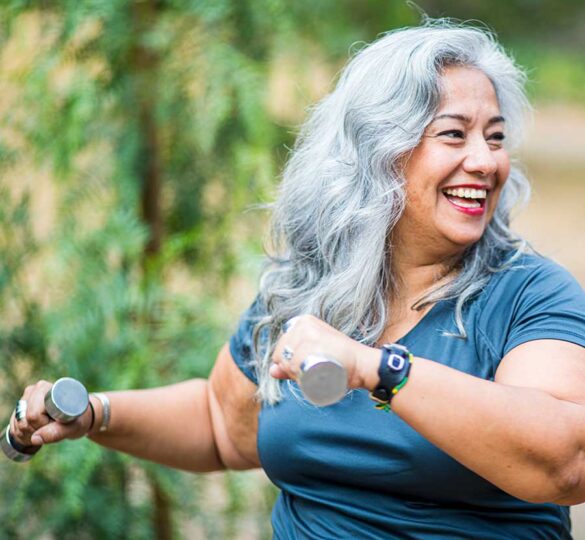Exercise, Diet and Other Lifestyle Changes for People Living with Glaucoma
An abundance of scientific evidence proves lifestyle changes—such as exercise and diet—can significantly impact an individual’s health.

Lifestyle choices are associated with preventing and controlling many health conditions, such as cardiovascular disease, hypertension, and cancer. An abundance of scientific evidence proves lifestyle changes—such as exercise and diet—can significantly impact an individual’s health.
Researchers believe that nearly half of all premature deaths can be attributed to unhealthy lifestyle choices. For example, healthy lifestyle choices can lower heart disease risk by almost 50 percent, and eliminating tobacco use can globally prevent up to 90 percent of lung cancer.
Recent studies are examining how lifestyle factors affect glaucoma. Measuring the effects of lifestyle factors is challenging because it relies heavily on self-reporting, so more research is needed to determine nutrition and lifestyle’s role in glaucoma. What is known suggests some modifications—such as eating foods rich in antioxidants, adding some supplements, and even sleeping differently—can be beneficial.
Exercise
Physical fitness is unquestionably one of the keys to good health, but those with glaucoma should take evidence-based recommendations to heart. Various exercises can have different effects on people living with glaucoma.
Aerobic Exercise
One recent study showed that moderate-to-vigorous physical activity decreased the average rate of visual field (VF) loss by approximately 10 percent. Another study confirmed that aerobic exercise (such as walking, swimming, biking, or working out on stationary machines) at a brisk level for 30 to 45 minutes three to four times a week lowered intraocular pressure (IOP) and improved blood flow to the brain and the eye.
Strength Training
Physicians recommend using caution and common sense when it comes to weight training due to a lack of large studies on the effect of weight training on IOP. Healthcare professionals don’t advise bench pressing 200 pounds, but lifting five and ten-pound weights doesn’t seem to affect IOP.
The Valsalva maneuver, which involves a person exhaling forcefully with a closed mouth and nose, blocking the windpipe by the closed epiglottis—is not recommended because it can dramatically increase IOP.
Yoga
The ancient practice of yoga includes various types and disciplines, some of which may help people with glaucoma and others that should be avoided.Preliminary evidence from various studies supports that yoga-based Tratak ocular exercise might decrease IOP in glaucoma patients and may halt further damage of retinal ganglion cells (RGCs). In addition, this intervention might be helpful in the prevention of the onset of glaucoma in high-risk individuals.
The safest way for people with glaucoma to practice yoga is to avoid inversions altogether. And, individuals with elevated intraocular pressure (IOP) need to be careful with certain yoga positions, including the following that can elevate IOP levels:
- The Adho Mukha Svanasana yoga position, commonly known as a downward-facing dog
- The Halasana position, also known as the yoga plow
- The Viparita Karani position, “legs up the wall”
Diet
You’re probably familiar with the expression, “you are what you eat.” The effects of diet on glaucoma are difficult to prove scientifically for various reasons. While the search for specific foods that can help manage glaucoma in conjunction with traditional medical intervention continues, interesting data has been uncovered concerning antioxidant-rich foods and the dietary intake of carbohydrates and essential fats and their effects on IOP and neuroprotection.
Plants
Incorporating fruits and vegetables into your diet is an excellent option for adding foods high in antioxidants and has shown some positive effects on glaucoma. One study of older African American women shows a significantly decreased risk of glaucoma with a diet high in fruits and vegetables. While another study found specific vegetables, such as carrots and leafy green vegetables, may be associated with a decreased risk of glaucoma.
The Mediterranean Diet
Long-studied for its many proven health benefits, the Mediterranean diet consists mainly of olive oil, legumes, unrefined cereals, fruits, vegetables, fish, and moderate consumption of dairy and wine, making it rich in antioxidants and omega-3s. Research shows that it may also help protect people with glaucoma.
Dietary Supplements
Doing a quick search on the internet will reveal a list of supplements promising to eliminate, even cure glaucoma. While these claims are false, there are some options with encouraging research to support their possible positive effects on patients with glaucoma. Patients should always consult with their physician before adding supplements to their diet.
- Coenzyme Q10, Also known as CoQ10 or ubiquinone
- Flavonoid anthocyanins
- Ginkgo Biloba extract (GBE)
- Magnesium
- Melatonin
- Vitamin B3
- Mirtogenol
Other Lifestyle Suggestions
Other lifestyle factors can affect IOP, some more obvious than others.
Sleeping Positions
Everyone has a favorite sleep position that they naturally observe. Researchers have correlated sleep positions with our dreams and even our personalities. Research also shows that IOP is higher when sleeping in the supine position (lying face up, horizontally) than other sleep positions, leading to recommendations that sleeping with the head elevated 20 to 30 degrees may lessen the effect of the supine position.
Avoid Cigarette Smoking
Studies on the impact of smoking on glaucoma are varied. Some research indicates smoking was associated with faster glaucoma progression, and other studies finding higher IOP in smokers vs. non-smokers. Smoking also increases the risks of various diseases, including those that affect the eye, such as cataracts and diabetic-related conditions.
Video: Lifestyle Modifications in Glaucoma — Leonard K. Seibold, MD
In this video, Leonard K. Seibold, MD, Professor of Ophthalmology and Glaucoma Fellowship Director at the University of Colorado, shares his expert insights on lifestyle factors such as diet, exercise, and stress management that support glaucoma care (and those that don’t).
Posted on May 14, 2021. Last reviewed on January 16, 2025.